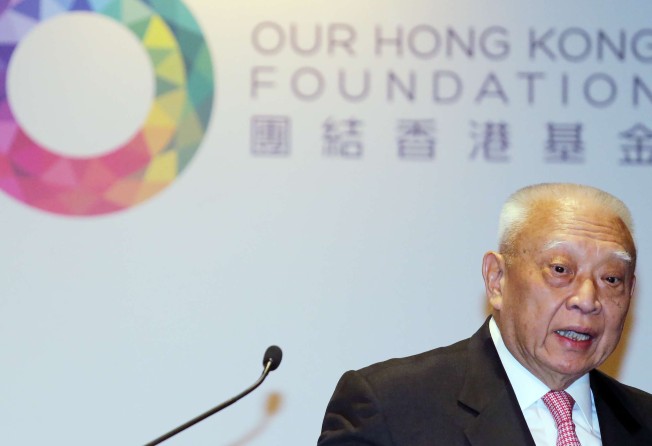Five Hong Kong think tanks make it to list of region’s top 90
Highest-ranking local organisation Our Hong Kong Foundation takes 60th place among rivals from China, India, Japan and South Korea

Five Hong Kong think tanks have made it onto a list of the top 90 in the region compiled by a US university – two more than in the same study last year.
But the highest spot occupied by one of the city’s think tanks was only 60th place, taken by Our Hong Kong Foundation, the young public policy organisation set up by former chief executive Tung Chee-hwa.
The four others that made the list, which encompassed think tanks from China, India, Japan and South Korea, were the Lion Rock Institute (67th), Civic Exchange (70th), the Hong Kong Policy Research Institute (77th), and the Hong Kong Centre for Economic Research under the University of Hong Kong (86th).
The rankings were part of an annual nine-month project by the University of Pennsylvania in the United States. A full report on the 2016 results is expected to be released this week.
Some 7,500 policymakers, experts and journalists were asked to nominate and rate about 6,800 think tanks from around the world. Criteria included the quality of publications and their ability to bridge the gap between policymakers and the public.
Tung’s foundation was founded in late 2014 and published its first report in 2015, just in time to be qualified for the 2016 rankings.
In the 2015 report, the Lion Rock Institute, a free-market think tank, was ranked 64th in the region. The Hong Kong Policy Research Institute, of which former Legislative Council president Jasper Tsang Yok-sing is a vice-chairman, took 65th place that year.
According to the 2016 report, there were 6,846 think tanks worldwide. The US had the largest number, at 1,835. There were 435 on the mainland and 288 in Britain.
Hong Kong had 30, compared to Singapore’s 12 and South Korea’s 35. There were 109 in Japan.
The Brookings Institution in the US remained the No 1 think tank worldwide, followed by Chatham House in Britain, both keeping their 2015 spots. The French Institute of International Relations came in third, up from 16th in 2015.
The annual think tank ranking project started in 2006.
Hong Kong Policy Research Institute director and chief executive Andrew Fung Ho-keung said the lack of a “culture of public policy research” in Hong Kong presented difficulties for the development of the sector.
“Unlike in countries such as the US, where enterprises like to hire think tanks to conduct research as a means to lobby congressmen or officials for policy support, in Hong Kong, the tycoons simply need to make a phone call to the government to make their views heard,” Fung said.
He added that a lack of resources was also an issue.
“For small-scale think tanks, they often have to bid for jobs from political parties or even district councils to stay afloat.”
Stephen Wong Yuen-shan, deputy executive director of Our Hong Kong Foundation, agreed that his group had an edge over other local think tanks because of its founder.
“Tung is a former chief executive, and it is easier for us to attract talent to work for us and to have access to officials,” Wong said.
But in order to cope with rapidly changing social sentiment, he added, the think tank had adopted a so-called “bottom-up” approach so as to reach out more to laypeople to feel the public pulse. This involved greater use of social media as a means of communication.
“Mere desktop research or discussion with experts will not be enough to produce quality research nowadays,” Wong said.
To increase its accessibility online, the foundation’s public policy institute – also headed by Wong – launched a Facebook platform last year.
The foundation has published eight research reports so far, covering land and housing, economic development, social innovation, science and technology innovation, and the ageing society.